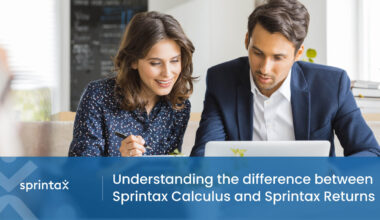Are you a nonresident student in America? Do you find US tax to be confusing?
Don’t worry, you’re not alone! Even for the most financially savvy US citizen, American tax can be pretty tricky.
That’s why we’ve prepared a list of common questions nonresidents ask us and answer them here in this handy blog!
So without further ado we can now reveal (and answer) the 13 most common US tax questions our customers ask us.
Table of Contents Show
1. What is the difference between being resident and nonresident for tax in the US?
If you’re not a US citizen, you will be considered a ‘nonresident alien’ for tax unless you meet the green card test or the substantial presence test.
Resident aliens are taxed on all of their income as if they were a US citizen. For a nonresident alien, only income that is generated from sources within the US (excluding certain investments) is taxed. Find more about US residency for tax purposes here.
Confused about your residency? Sprintax will review your circumstances and determine your residency status for you.
2. What is dual-status residency?
You are a ‘dual status alien’ when you have been both a US resident alien and a nonresident alien in the same tax year.
Dual status does not refer to your citizenship, only to your resident status for tax purposes in the US.
Based on the information you provide, Sprintax Returns will correctly determine your residency status and inform you if you are a resident or dual-status resident.
If you are considered a nonresident for tax purposes you will be able to complete your return with Sprintax.

3. What is the difference between residency for Federal tax purposes and for State tax purposes?
State residency is not the same as Federal residency.
Even if you are a nonresident for Federal tax purposes you may be considered resident for State tax purposes.
Sprintax correctly determines your residency status based on the information provided in your account.
The procedure for establishing State tax residency varies from state to state. Most States will look at a list of residency factors such as domicile (permanent residency), or the day counting rule.
Owning a home, family location and financial interests are other factors which help determine residency.
Depending on your circumstances, you can be considered a resident of the State in which you currently live, but still be considered domiciled in another State or country to which you intend to return.
Determine your residency status with Sprintax Returns.
4. I’m a nonresident studying in the US. Do I need to report foreign income for my Federal income tax return?
As a nonresident you are not required to report income from sources outside the US on your US Federal tax return.
However, some States may require you to report foreign employment income on your State return.
5. Should I file a separate return for each employer I had during the year?
No!
You should not submit separate returns for each employer you had during the year.
Instead, every W-2 (and/or any other income document that you received during the year) should be reported on the same tax return.
With Sprintax Returns, you will be able to report all your payment documents on one tax return.
Simply choose the type of document(s) you have (W-2, 1042-S, 1099, etc.) and for each document type select the relevant quantity of documents.
If, for example you had two employers you should select W-2 as the document type and ‘2’ as quantity.
6. What’s the difference between active and passive income?
You receive active income in exchange for a service you have performed.
It can include wages, tips, salaries, commissions, and income from businesses in which there is material participation.
Passive Income is earnings you receive from a rental property, limited partnership, or another enterprise in which you are not actively involved.

7. What is a tax treaty?
A tax treaty is an agreement between two countries regarding how they tax each other’s citizens.
Residents of foreign countries that have tax treaties with the US are taxed at a reduced rate or are exempt from paying US taxes altogether.
The reduced rates and exemptions vary widely among the countries that have tax treaties with the US.
Learn more about US tax treaties here.
8. Who is eligible for a tax treaty?
Each treaty has a variety of terms and clauses that will affect whether or not you can claim an exemption from paying tax.
Your entitlement to avail of a tax treaty depends on a number of factors including nationality, length and purpose of stay, type of income, employment type and more.
When you enter all your information in Sprintax, it will automatically determine whether you’re eligible to avail of a tax treaty. And make the appropriate calculations on your tax return.
9. What happens if I don’t file a compliant US tax return?
It’s vital to comply with US tax law, especially if you would like to visit the US in the future.
If you do not file a correct tax return you may end up having to pay some unwanted fines or penalties.
10. How much tax is deducted in the US?
There are two types of income tax in the US – Federal and State.
Federal tax is progressive. In other words, the more you earn the more tax will be deducted from your pay by your employer.
For example, all nonresidents must pay 10% in Federal income tax up to $11,925. And if you earn more than this amount, you must pay 12% in income tax on the amount between $11,601 and $48,475 (2025).
The amount of State tax that you pay depends largely on where you earn the income, as tax rates differ from state to state.
11. Can nonresidents claim a tax refund?
Yes, there is a very good chance that you’ll be entitled to a tax refund.
The average State tax refund for a Sprintax customer is $462. But remember, in order to receive your refund you will need to file a tax return.
It’s your money. So file your nonresident tax return and claim your cash!

12. Tax is so boring! What’s the easiest way to file a return?
The easiest way to file a tax return is to choose Sprintax!
Sprintax is the only online software for nonresident federal tax e-filing and state tax preparation in the US.
When you choose Sprintax, you can enjoy a stress-free service from start to finish. Plus, if you have any questions, our live chat team are on hand 24/7 to support you.
13. What is the benefit of filing my tax return with Sprintax?
When you create your account, the Sprintax software will assist you in preparing fully compliant Federal and State tax returns.
Sprintax will also enable you to receive your maximum legal tax refund.
Sprintax is the ‘go-to’ tax filing software for numerous major universities in the US including NYU, Columbia, Arizona State University, Illinois Institute of Technology and Cornell.
We’re also the nonresident partner of choice for Turbo Tax.
We also offer a Live Chat service. Our team is on hand to guide our customers and answer their tax questions throughout the prep process.
Prepare your nonresident alien tax return the easy way – choose Sprintax!
Got more questions?
Check out these additional resources:









